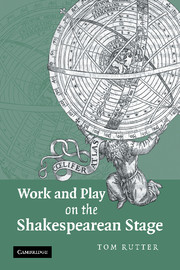Book contents
- Frontmatter
- Contents
- Acknowledgements
- Note on texts and dates
- Introduction
- Chapter 1 Work in sixteenth-century England
- Chapter 2 ‘Vpon the weke daies and worke daies at conuenient times’: acting as work in Elizabethan England
- Chapter 3 ‘Though he be a king, yet he must labour’: work and nobility in Shakespeare's histories
- Chapter 4 ‘We may shut vp our shops, and make holiday’: workers and playhouses, 1599–1601
- Chapter 5 ‘Work upon that now!’: labour and status on the stage, 1599–1610
- Conclusion
- Notes
- Bibliography
- Index
Introduction
Published online by Cambridge University Press: 22 September 2009
- Frontmatter
- Contents
- Acknowledgements
- Note on texts and dates
- Introduction
- Chapter 1 Work in sixteenth-century England
- Chapter 2 ‘Vpon the weke daies and worke daies at conuenient times’: acting as work in Elizabethan England
- Chapter 3 ‘Though he be a king, yet he must labour’: work and nobility in Shakespeare's histories
- Chapter 4 ‘We may shut vp our shops, and make holiday’: workers and playhouses, 1599–1601
- Chapter 5 ‘Work upon that now!’: labour and status on the stage, 1599–1610
- Conclusion
- Notes
- Bibliography
- Index
Summary
In his Preface to The Oxford Book of Work, Keith Thomas notes the imbalance between the time and energy we expend on work and its comparatively meagre presence in literature: ‘for all its centrality to human existence, work has never been a popular literary theme. By comparison with love or warfare, the business of getting a living has been relatively neglected by poets and novelists.’ According to Thomas, classical ideas of aesthetic decorum meant that workers tended to be marginalised, ridiculed or, at best, idealised into pastoral, while popular literature has usually sought to carry readers away from their daily working lives. Furthermore, because work is ‘a long, continuing process, rather than a discrete act’, it is difficult to capture its essence within the formal confines of a literary text.
On this basis, the treatment of work in the drama of Shakespeare's time ought to be an unpromising subject for a book. Admittedly, the principle of decorum was never wholeheartedly observed on the Renaissance stage, to the dismay of commentators such as Sir Philip Sidney, who lamented plays' ‘mingling Kinges and Clownes’. However, the English drama was evidently popular, speaking to a broader audience than any purely literary art was able to: according to one opponent of the theatre writing in 1582, the former playwright Stephen Gosson, ‘the common people which resort to Theatres’ consisted of ‘Tailers, Tinkers, Cordwayners, Saylers, olde Men, yong Men, Women, Boyes, Girles, and such like’.
- Type
- Chapter
- Information
- Work and Play on the Shakespearean Stage , pp. 1 - 10Publisher: Cambridge University PressPrint publication year: 2008



